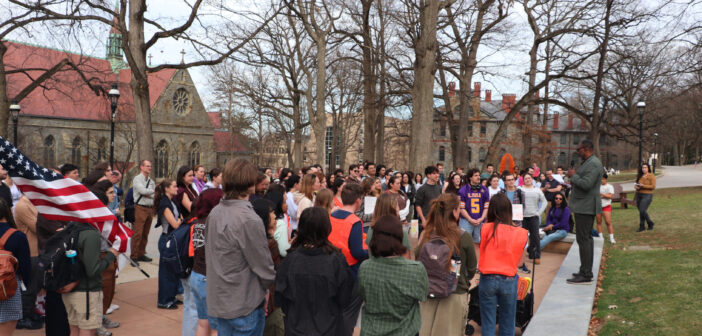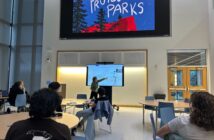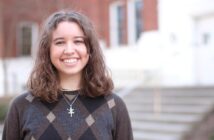In light of recent executive orders proposing to ban diversity, equity and inclusion initiatives in the United States, various Lehigh organizations came together to host a diversity, equity and inclusion and accessibility solidarity walk.
The event was hosted by the Pride Center, the Center for Cultural Engagement, and the Gender, Leadership and Empowerment Center. More than 200 students marched the perimeter of Lehigh’s campus on Wednesday, holding signs and chanting, “Who is DEI? We are DEI.”
Julia Contino, ‘25, The Brown and White’s managing editor of diversity, equity and inclusion, was a primary organizer of the event, along with Liana Secondino, ‘25, and Ariana Bond ‘28.
Contino said the purpose of the walk was to build community.
“It’s easy to choose hate and divisiveness, but centering a community around love is our strength,” Contino said.
Before the walk began, attendees gathered at the Clayton University Center flagpole. There, Donald Outing, Lehigh’s vice president of equity and community, reaffirmed the university’s commitment to DEI values.
Outing said Lehigh’s dedication to DEI is unwavering, as it aligns with the university’s mission to foster intellectual curiosity, respect and opportunity.
“I ask each of you to reaffirm your commitment to these values, not as a statement against anything, but more of a declaration of what we value as essential to the mission of this institution and that this is a Lehigh that is truly for everyone,” he said.
Scott Burden, director of the Pride Center, also spoke at the walk. They highlighted women throughout history who have advocated for LGBTQ+ rights in recognition of Women’s History and Awareness Month.
Burden emphasized the importance of looking to those who paved the way, which makes it possible for others to be inspired and build their futures.
“What is happening right now is an explicit attempt to limit and dull the futures of this beautiful crowd, right?” they said. “And thankfully, we know, because of these people, that those efforts will fail.”
Burden mentioned Sylvia Rivera, an advocate for the rights of transgender people in the 1960s and ‘70s, and LGBTQ+ rights activist Marsha P. Johnson, a key figure in the 1969 Stonewall riots, in their speech.
They also spoke about Lia Thomas, a transgender professional swimmer and University of Pennsylvania graduate, whom they said reminds them of the importance of challenging norms and embracing possibilities.
Burden concluded their speech by sharing author bell hooks’ definition of love, describing it as both an intention and an action.
“Let us continue to act with intention, but also continue to act with action,” Burden said.
Kwynsky Miguel, ‘25, who works with the Center for Cultural Engagement, spoke about her experience as a Filipino American at the walk.
Miguel said attending Lehigh, a predominantly white institution, initially made her apprehensive as a minority. However, due to the support she’s received from on-campus offices built on DEI principles, she said she was able to find the resources and opportunities she was looking for.
Miguel also said joining different identity-based clubs, cultural clubs and organizations that promote anti-racist practices is one way to advocate for DEI on campus.
“I encourage all of you to learn about your peers who have a different identity and background than yours,” she said. “When you take the time to learn about someone else’s heritage, you’re taking the time to appreciate them as a human being, and you’re also taking the time to see that you are similar, more than you know.”
As the march progressed, students chanted while walking from the flagpole to the Zoellner Arts Center.
Officers from the Lehigh University Police Department were also present throughout the walk.
Stephen Marks, a police sergeant for LUPD, said there have been instances in the past when individuals arrived at rallies held on campus holding signs that included “not inclusive speech.”
The police were present on Wednesday to provide safety and security, he said.
“We’re just making sure that everybody’s rights and freedom are protected and respected and that nobody has a hard time,” he said.
Halfway through the walk, the crowd paused outside of Zoellner to hear Demi Moore, ‘27, share her experience as a queer person of color.
Moore said she grew up feeling unwelcome in her home state of Florida, where she censored herself when discussing political and controversial topics in order to maintain her credibility in high school. Even though she felt strongly about many topics, she said she tried to remain objective and unbiased.
When coming to Lehigh, she said she was initially anxious that she would have to continue relying on her old habits to have a voice. However, Moore was relieved to find a community of students and faculty who are accepting of differences and cognizant of marginalized groups.
“I have since realized that by being objective, I was silencing myself and becoming desensitized to the marginalization of myself and others,” Moore said. “The reality is that injustice becomes entrenched the moment we accept apathy and inequality as normal.”
Lloyd Steffen, university chaplain and professor of religion, also spoke outside of Zoellner.
Steffen said if executive orders eliminating DEI efforts had provided justification, the eliminations might have garnered more support, but that hasn’t happened.
“I have not yet heard from a government official of the United States that we have addressed gender, ethnic, racial and religious discrimination to the point that it is undetectable,” Steffen said.
While programs and offices dedicated to diversity help address systemic issues, he said they cannot fix them completely. Steffen also said universities bring together diverse populations, and an experience devoid of diversity is inadequate preparation to live successfully in today’s society.
Students then returned to the flagpole, where members of the Marching 97 performed before closing remarks.
Max DeCaro, ‘25, attended the event. They said they thought the walk promoted visibility on campus by encouraging people to explore what DEI truly means rather than falling for the “political rhetoric” surrounding it.
“I am a queer person from Alabama, where those who are different in the realms of gender, sexuality, languages they speak and disabilities are not treated with the respect they deserve,” they said.
DeCaro also said it was important to them that the sentiment of the walk reached as many people as possible.
Contino said since Lehigh is committed to being a university for everyone, it’s essential to show up and demonstrate the importance of diversity, equity and inclusion. She also said even if the language surrounding DEI changes, the passion will remain the same.
“You can delete the letters ‘DEI’ from existence, but you can’t delete the people, the passion or the movement,” she said.






Comment policy
Comments posted to The Brown and White website are reviewed by a moderator before being approved. Incendiary speech or harassing language, including comments targeted at individuals, may be deemed unacceptable and not published. Spam and other soliciting will also be declined.
The Brown and White also reserves the right to not publish entirely anonymous comments.